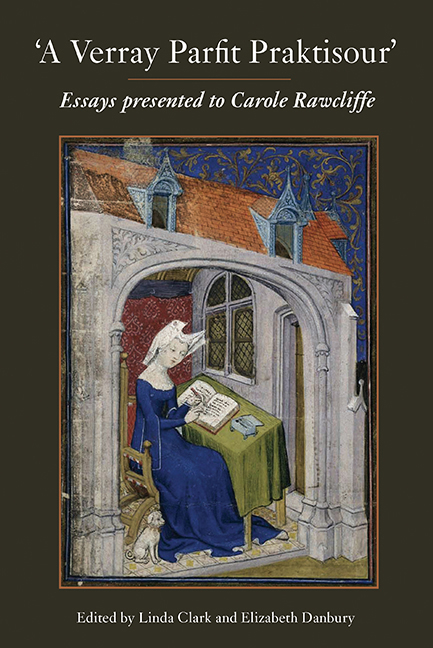Book contents
- Frontmatter
- Contents
- List of Illustrations
- List of Contributors
- Acknowledgements
- Abbreviations
- Tributes
- 1 Coslania, Norwich: an Archaeological Contribution to Early Medieval Urban History
- 2 A Queen in Rebel London, 1215–17
- 3 Defensive Officials and Defensive Levies in Fourteenth-Century Muster Rolls: an East Anglian Perspective
- 4 Lettice Oo? Queen Isabella's Accidental Apothecary
- 5 The First Instrument of Medicine: Diet and Regimens of Health in Late Medieval England
- 6 Politics and Piety: Norwich City Churches, Commemoration and Networking for the Afterlife
- 7 Telling the Time in Chaucer's London
- 8 The Bankrupt Bibliophile, William Paston, 2nd Earl of Yarmouth (1654–1732)
- 9 Ottomans, Neo-Ottomans and Invented Tradition in Hospital Music Therapy
- The Published Works of Carole Rawcliffe, 1976–2016
- Index
- Tabula Gratulatoria
2 - A Queen in Rebel London, 1215–17
Published online by Cambridge University Press: 09 May 2017
- Frontmatter
- Contents
- List of Illustrations
- List of Contributors
- Acknowledgements
- Abbreviations
- Tributes
- 1 Coslania, Norwich: an Archaeological Contribution to Early Medieval Urban History
- 2 A Queen in Rebel London, 1215–17
- 3 Defensive Officials and Defensive Levies in Fourteenth-Century Muster Rolls: an East Anglian Perspective
- 4 Lettice Oo? Queen Isabella's Accidental Apothecary
- 5 The First Instrument of Medicine: Diet and Regimens of Health in Late Medieval England
- 6 Politics and Piety: Norwich City Churches, Commemoration and Networking for the Afterlife
- 7 Telling the Time in Chaucer's London
- 8 The Bankrupt Bibliophile, William Paston, 2nd Earl of Yarmouth (1654–1732)
- 9 Ottomans, Neo-Ottomans and Invented Tradition in Hospital Music Therapy
- The Published Works of Carole Rawcliffe, 1976–2016
- Index
- Tabula Gratulatoria
Summary
Queens, both young and old, have long flocked to London. From Emma of Normandy, widow of Aethelred II, abducted from the city after 1016 to be married to King Cnut, through to the later inhabitants of Marlborough or Clarence House (not to mention Tavistock Square), London has played a leading role in English queenship. Proximity not just to luxury retailers but to political events explains this conjunction. Its effects have been of more than passing significance. From the abduction of Emma, the Norman Conquest flowed. It was the Empress Matilda's undiplomatic approach to the Londoners in 1141 that restored King Stephen to the throne of England (and kept the Plantagenets off it) for thirteen crucial years. Three centuries later, in the dying days of Lancastrian kingship, it was to the Tower of London that Henry VI's queen, Margaret of Anjou, was consigned, having been captured at Tewkesbury in 1471. In London also died the last two Yorkist queens, Anne Neville, wife of Richard III, in 1485, six months before Bosworth Field, and Elizabeth Woodville, widow of Edward IV, at Bermondsey in 1492, seven years after the accession of Henry Tudor. Meanwhile, from the events described below flowed the making and enforcement of Magna Carta. With Magna Carta came the recognition that queens, like other widows and heiresses, were more than ‘animated title-deeds’, but enjoyed privileged status under English law. Ultimately, as first Mary Tudor, and then Elizabeth I, were to prove, this was to assist women in ruling as female kings.6 What follows, the story of one particularly distinguished dowager exploited by her male contemporaries, is offered here as a tribute to another dowager more sensible, more admired and, as this and other essays in the present volume should make plain, a great deal better regarded.
We shall meet our particular dowager, Isabella of Gloucester, wife of King John, in due course. First, let us explore the circumstances of her descent upon London. King John, Isabella's one-time husband, was forced into negotiations at Runnymede early in June 1215. This was a direct consequence of the events of Sunday 17 May 1215, when the city of London had been seized in a bloodless coup by the barons recently decamped from Northampton.
- Type
- Chapter
- Information
- A Verray Parfit PraktisourEssays presented to Carole Rawcliffe, pp. 23 - 50Publisher: Boydell & BrewerPrint publication year: 2017



